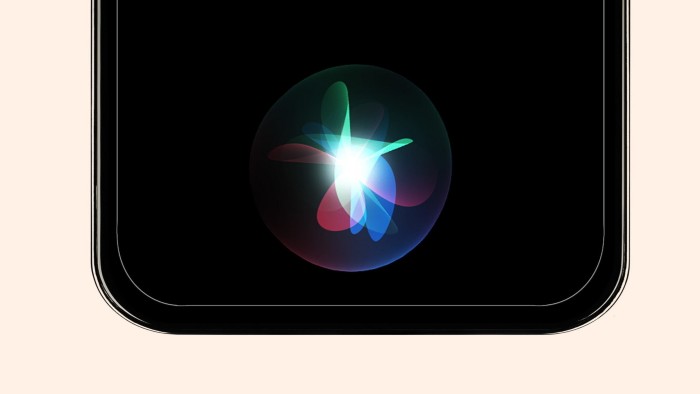Unlock the Editor’s Digest for free
Roula Khalaf, Editor of the FT, selects her favourite stories in this weekly newsletter.
Apple is struggling to deliver upgrades to its artificial intelligence voice assistant for the iPhone, with investors downbeat about the potential for major AI announcements at its flagship annual event next week.
Recently departed employees told the Financial Times that the Silicon Valley giant has been hit by challenges with updating Siri using cutting-edge large language models that can deliver more sophisticated responses to spoken prompts.
Apple has been attempting to build its own LLMs over the machine learning technology that currently powers Siri, a product already used in hundreds of millions of its bestselling devices, with the aim of creating a truly conversational assistant.
Former executives said that the process of integrating the technologies has led to bugs, an issue not faced by competitors such as OpenAI which have built generative AI-based voice assistants from scratch.
One former Apple executive said: “It was obvious that you were not going to revamp Siri by doing what executives called ‘climbing the hill’,” meaning to incrementally develop the product rather than rebuilding it from the ground up.
“It’s clear that they stumbled,” the person added.
The updates to Siri form a key part of “Apple Intelligence,” a suite of AI features announced at the company’s Worldwide Developer Conference last year and intended to boost hardware sales.
The FT reported this week that Apple’s attempt to rollout the AI features in China, powered by models made by Alibaba, is being held up by a Beijing regulator. Sensitive deals in the country involving American tech companies have come under closer scrutiny in response to US President Donald Trump’s trade war.
Repeated failures to release Apple Intelligence features that have already been announced has meant expectations are low for this year’s WWDC, which kicks off next week.
“We’re at the point where investors already know what the good news potentially is, and it’s about: let’s first have you deliver what you promised last year,” says Samik Chatterjee at JPMorgan.
The AI struggles have weighed on the tech giant’s stock. It has been worst-performing of the so-called Magnificent 7 tech stocks in 2025, down around 18 per cent since the start of the year and below the tech-heavy Nasdaq which is largely flat.
Trump’s tariffs, competitive threats in China, and legal pressure on Apple’s high-margin services business have also led to investor concerns about its long-term growth.
At the core of Apple’s AI troubles is Siri, its legacy voice assistant which is seen as critical to unlocking true “agentic” abilities on the iPhone and other Apple devices.
When ChatGPT launched in late 2022, “the way companies were doing conversational interaction was changing rapidly, and it was clear Siri was coming up short,” said another former senior Apple employee who worked on the technology ahead of the launch.
The person added that they were “surprised” to see features announced last year that were ultimately “not going to make it” in time for Apple Intelligence’s initial release.
As well as operating much larger and more powerful models, the likes of OpenAI, Google and Perplexity all have launched voice assistants that are widely viewed as smarter than Apple’s.
The iPhone-maker’s answer was to focus last year’s annual developer conference on its own AI push, where it teased an AI-upgraded assistant able to read the user’s screen, draw on their contextual information and take actions within their apps.
A group of AI features such as writing aids, image and emoji generation and camera-based search have already hit the market.
The heralded changes to Siri are yet to be released, however. Chief executive Tim Cook recently admitted the technology did not meet the company’s “high quality bar” and was “taking a bit longer than we thought.”
The delays led to Apple pulling TV ads featuring The Last of Us star Bella Ramsey that promoted the new Siri update. The company drew a number of false advertising lawsuits from consumers.
The current delays to Siri mean that Apple is essentially three years or more away from delivering “a truly modern AI assistant, long after Google and others have integrated such tech,” Bank of America analysts wrote on Monday.
The failures have led to changes at Apple. John Giannandrea, its AI guru poached from Google in 2018, saw the Siri product division removed from his remit earlier this year and transferred to Mike Rockwell, the executive behind the Vision Pro headset.
A former Apple executive said that fragmented leadership teams led to a lack of a unified strategy around AI, made worse by an initial lack of appetite on the part of top executives to allocate a big enough budget for the build-out of the technology.
Another challenge for is Apple’s focus on user privacy and security. It has prioritised running its AI features through smaller models and user data staying on the device, which former employees said adds another layer of complexity to the challenge.
This stands in contrast to larger LLMs such as those that power OpenAI’s ChatGPT, which run through the cloud on powerful servers. Apple has leaned on OpenAI by releasing ChatGPT integration with Siri.
Since then, OpenAI has signalled its own ambitions in the hardware space, with chief executive Sam Altman announcing a $6.5bn deal to acquire IO, the company founded by former Apple designer Jony Ive, who will now be creating products for a potential rival. Apple shares fell about 2 per cent on the news.




